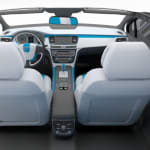 Borealis and Borouge announced the introduction of several new and upgraded material solutions engineered to enable the automotive industry to achieve greater cost efficiency, higher performance and improved sustainability in vehicle components. The new lightweight grades Fibremod WE380HP and Daplen EE058AI are representative of Borealis and Borouge's commitment to offering new and multi-faceted solutions to automotive OEMS around the globe and will be showcased in October at the IZB 2014 in Wolfsburg, Germany, along with a Brazilian premiere grade.
Borealis and Borouge announced the introduction of several new and upgraded material solutions engineered to enable the automotive industry to achieve greater cost efficiency, higher performance and improved sustainability in vehicle components. The new lightweight grades Fibremod WE380HP and Daplen EE058AI are representative of Borealis and Borouge's commitment to offering new and multi-faceted solutions to automotive OEMS around the globe and will be showcased in October at the IZB 2014 in Wolfsburg, Germany, along with a Brazilian premiere grade.Lightweight solutions thanks to Fibremod and Daplen
In so-called hybrid grades, reinforcing polypropylene (PP) with a combination of glass fibre and mineral filler yields a special performance grade. As one such grade, Fibremod WE380HP is a new hybrid PP compound comprised of 20% glass fibre reinforcement and 10% mineral filler. It is intended for use in both structural and visible automotive parts, such as under-the-bonnet (engine covers, gear housings) and high-end interior applications (window frames, arm rests). As a replacement for other materials, Fibremod WE380HP is a lightweight solution that contributes to lower fuel consumption and reduced CO2 emissions without compromising on visual aesthetics or performance. The grade can bear a high mechanical load, offers excellent processability, outstanding dimensional stability, low warpage, good heat resistance and allows for self-colouring. In addition to this multi-talented new material, other lightweight grades being highlighted at the IZB include the pioneering PP natural fibre grades NJ200AI and NJ201AI, both of which allow for 9% weight savings when compared to a PP-T20.The recently-launched thermoplastic olefin (TPO) compound Daplen EE058AI is not only lightweight, but also offers tiger stripe-free technology, as does the upgraded Daplen EE189HP. Automotive OEMs continue to seek out materials that help reduce overall vehicle weight in order to improve fuel consumption and fulfil stringent CO2 emissions standards, while still meeting requirements in terms of efficient processing and surface aesthetics. The phenomenon of tiger stripes - the visually recognisable periodic change of surface gloss – is caused by converting processes and is a general problem of all thermoplastic materials, including polyolefins. The newly-developed, tiger stripe-free TPO compound Daplen EE058AI boasts an excellent property profile and is a fitting replacement for conventional T15 and T20 interior materials.
"Borealis and Borouge are attuned to the needs and demands of the automotive industry," says Harald Hammer, Borealis Vice President of Engineering Applications. "We will continue to develop lightweight PP solutions for automotive compounds that not only help our customers and partners achieve broader, long-term sustainability objectives, but also enhance automotive surface aesthetics."




